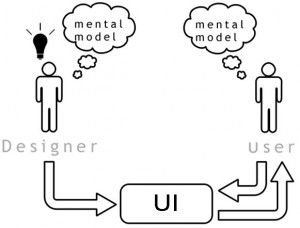The Problem with Business Intuition and Mental Models
 At the core, the major decisions we make are based on our understanding of causality. If we do x, then y will happen. Historically in business, that kind of causality for the most part has not been described and validated as repeatable “if x, then y” relationships. More commonly, the way we deal with the lack of mathematically certain causal relationships is simply to apply our business acumen or intuition. Some executives may prefer describing intuition as their mental models that provide the means to understanding the way the business world works. A few years ago I helped develop a complex systems model to improve the FAA’s strategic planning and decision-making. The model described the FAA, the services it delivered, the consumers of that service, the myriad of causal relationships between stakeholders and mechanisms that comprised the system, and the characteristics of the environment. Models of this type strive to capture all of the dominant forces and causal relationships in the system. Typically, the initial step involves tapping thought leaders in the field to capture their respective mental models. Once you have a sufficient number of mental models to fully cover the major areas of your system, you must integrate and reconcile the consistencies in the mental models. It takes stakeholder engagement, healthy debate, and open hearts and minds to resolve inconsistencies. I was delighted when the thought leaders finally ironed out their differences to reach solid consensus on what the model should look like. The best minds in the business had developed a unified, integrated mental model of the larger system. The next major step was to apply historical data to the model to verify that the model replicated what had actually happened in the real world. It didn’t even come close. Our experienced modeling experts smiled at us and told us that this is what happens every time—that’s right, every time! After much more work and testing, we finally were able to achieve success and begin using it. But, the more lasting lesson for me was that even the best minds in the business are planning and making major decisions on the basis of mental models that are more than likely flawed. Unless you’re operating in a simple business in a simple business environment, complex system models and data provide opportunities to vastly improve the quality of your plans and decisions.
At the core, the major decisions we make are based on our understanding of causality. If we do x, then y will happen. Historically in business, that kind of causality for the most part has not been described and validated as repeatable “if x, then y” relationships. More commonly, the way we deal with the lack of mathematically certain causal relationships is simply to apply our business acumen or intuition. Some executives may prefer describing intuition as their mental models that provide the means to understanding the way the business world works. A few years ago I helped develop a complex systems model to improve the FAA’s strategic planning and decision-making. The model described the FAA, the services it delivered, the consumers of that service, the myriad of causal relationships between stakeholders and mechanisms that comprised the system, and the characteristics of the environment. Models of this type strive to capture all of the dominant forces and causal relationships in the system. Typically, the initial step involves tapping thought leaders in the field to capture their respective mental models. Once you have a sufficient number of mental models to fully cover the major areas of your system, you must integrate and reconcile the consistencies in the mental models. It takes stakeholder engagement, healthy debate, and open hearts and minds to resolve inconsistencies. I was delighted when the thought leaders finally ironed out their differences to reach solid consensus on what the model should look like. The best minds in the business had developed a unified, integrated mental model of the larger system. The next major step was to apply historical data to the model to verify that the model replicated what had actually happened in the real world. It didn’t even come close. Our experienced modeling experts smiled at us and told us that this is what happens every time—that’s right, every time! After much more work and testing, we finally were able to achieve success and begin using it. But, the more lasting lesson for me was that even the best minds in the business are planning and making major decisions on the basis of mental models that are more than likely flawed. Unless you’re operating in a simple business in a simple business environment, complex system models and data provide opportunities to vastly improve the quality of your plans and decisions.



Connect
Connect with us on the following social media platforms.